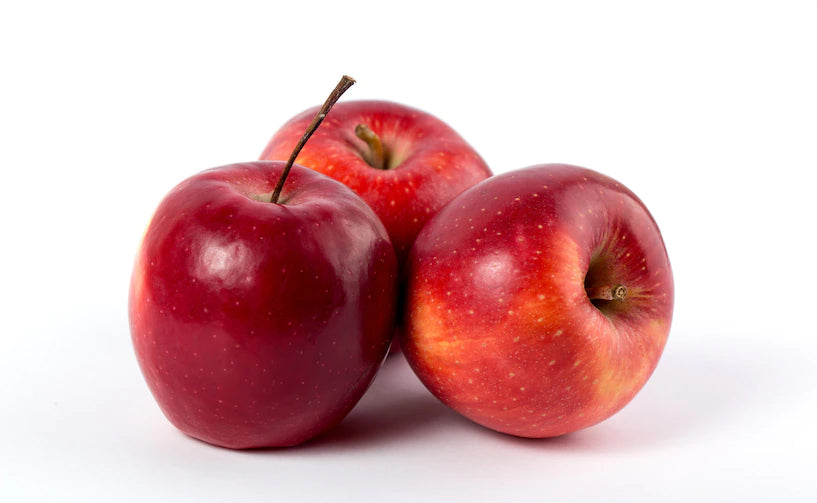Orchard apple or Malus domestica has its origin in Western Asia. There, it is an extensively cultivated deciduous tree. It belongs to the family “Rosaceae”. Tree blossoms in between summer and winter. The fruit of this tree has been an important food for people of Europe and Asia for thousands of years. The growth and cultivation of this tree spread to North America. It is one of the oldest orchard trees and has been known for centuries. The tree is present, most probably, since the time of Alexander the great.
The tree has a medium height which ranges from 6 feet to 15 feet. The wild species of the tree may be more than 15 feet in height. It generally has simple oval leaves and white and pink flowers which can further develop into large and green, yellow or red coloured fruits called apples.
Apple is rich source of numerous phyto-nutrients such as flavonoids including quercetin, flavonols, and catechins, and phenolic group compounds including procyanidins and epicatechin.
Red apples contain glycoside called anthocyanin (cyanidin 3-O-galactoside).
Apples are profusely loaded with vitamin C, which is a well-known natural anti-oxidant and works against the free radicals along with enhancing the body’s immunity. Apples also have ample amount of vitamin B-complex which includes vitamin B6, riboflavin and thiamine. Vitamin B-complex keeps the nervous system and the red blood cells healthy.
Antioxidants present in apple which include epicatechin, quercetin, phlorizin, chlorogenic acid, and anthocyanins, gallic acid, procyanidins and many more. Beside these, it is rich in dietary fibre especially pectin, and phytonutrients or polyphenols, which protect the tissues from free radicals and other toxins. Apples are also a good source of natural minerals including calcium, phosphorus and potassium.
Apples are the richest source of flavonoids, a group of phytonutrients, especially quercetin that have high antioxidant status.
Benefits of Apple:
-
Boosts Immune System: Apple possesses rich amount of quercetin flavanoids that may help in reducing the inflammation and thus regulating various inflammatory reactions. Apple helps in boosting the immune system.
-
Fights Anaemia: Apple is a rich source of iron and helps in fighting anaemia.
-
Helps in Weight Loss: Apple helps in weight loss, as it is filling due to its high fibre content.
-
Good for Heart: It is good for the heart because of the presence of a soluble fibre called pectin that may help to lower down blood cholesterol level. Another important anti-oxidant epicatechin in apple helps in lowering the blood pressure.
-
Lowers Bad Cholesterol: High intake of flavonoids in apple is linked with low rate of stroke and heart disease by lowering down the bad cholesterol or LDL level.
-
Decreases Risk of Diabetes: Consuming apple on a regular basis may lower the risk of type 2 diabetes since the polyphenols present in it may prevent beta cell damage of the pancreas.
-
Improves Gut Health: Apple may exert a probiotic effect on the intestinal health and hence improves gut bacteria.
-
Reduces Risk of Cancer: Apple is instrumental in lowering the rate of cancer due to its anti-oxidant and anti-inflammatory actions.
-
Fights Free Radicals: Apple helps to protect the lungs and the other organs of the body from the free radicals.
-
Improves Digestion: Apple maintains bowel movements, and prevents constipation due to the presence of dietary fibres.
-
Limits Lipid Absorption: High fibre content in apple also prevents high cholesterol, LDL and triglyceride levels and limits lipid absorption.
- Improves Brain’s Health: Apple helps to restore brain’s health and prevent harmful oxidative stress in the brain cell, and hence minimises the decline of brain. It helps in preserving neurotransmitters such as acetylcholine, which otherwise may get decline with age, and may contribute to Alzheimer’s disease.
Since the nutrient content of apple makes it an exceptional fruit for improving over-all health, it finds its place in different Ayurvedic products.






